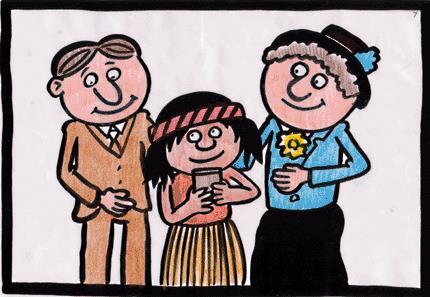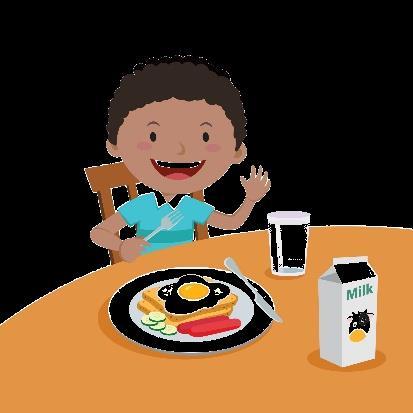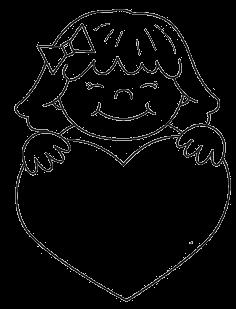









Ngakuku, the tamariki, and the missionaries had left Matamata that morning.
Fighting had started among the tribes, so they decided to take the tamariki to a safe place –his Uncle’s Pa at Tauranga.

What was that!?

Chief Ngakuku listened carefully for the smallest sound. Something had disturbed his moe.


They all ran for the shelter of the bush as the fierce Rotorua warriors rushed in on their camp.

One or two of the tamariki fell over rakau roots as they were running into the forest. They were all mataku.

The Waharoa's Pa was well protected with many warriors. They would be safe there.

He heard the noise again - they were being attacked. He quickly shouted a warning to the others as he picked up his little tama.


Ngakuku remembered that earlierinthepo,astheywere setting up camp at Wairere, Tarore had read from her little pukapuka.
She told them: "Do not be afraid. Ihowā will take care of us."

When they had all reached a good hiding place, Ngakuku started counting . . . . Wiremu . . . Moana . . . Tarore . . . where was Tarore?
Had anyone seen Tarore?
Fear gripped Ngakuku's manawa as he realised his 12 year old tamahine was missing.




Mr and Mrs Brown, the missionaries, had taught Tarore how to read and write, and she would often read from this strange pukapuka.

The pukapuka was full of stories of the one true Atua who had aroha for everyoneandwantedthemtoliveinpeace,andnothavehateintheirmanawa.
Tarore said the pukapuka was Te Rongopai a Ruka - the Good News from Luke.

She had written "Ngakuku" her papa’s name, on the first cover.
This part of the Paipera Tapu was one of the first books written in the Māori language.

But . . . where was Tarore now?
Ngakuku's manawa was filled with fear - all the warriors from Rotorua hated them. Had they taken her captive?
Ngakuku and the others waited, and when it was safeto return to their camp, they went back to look for Tarore.



Looking around at their raided campsite, Ngakuku saw what he had feared most - beside a rakau - the body of his little tamahine.
Sadly, he gathered her in his arms. The wāhine began to wail and the tāne, in their suffering, planned their revenge. They would get a war party together and hunt down Tarore’s murderers.

“KAORE”
Ngakuku said.
“There has been too much killing already.”

"Remember the words of Ihowā in Tarore’s pukapuka." said Ngakuku.

"We should aroha those who hate us, just as Ihu Karaiti did."
This was hard for the warriors to understand, but they could see that their Chief wanted to follow the ways of Ihowā, and so they obeyed him.

Meanwhile, one of the Rotorua warriors, Uira, was studying Tarore's Gospel of Luke.

He had taken the flax kit from Tarore, thinking it contained something of value, but all he had was a pukapuka.

A pukapuka was no use to him. He didn’t know how to read, so Uira threw it away. The pukapuka lay on the ground for a while until someone picked it up.
Afewdayslateraslavetanecalled Ripahau came into Uira's Pa.

He was returning from Paihia in the north of Otaki.
Hesawthepukapuka,andaskedif he could look at it. He started to readit.Thetāneandwāhineofthe Pa gathered around to listen.

Uira was nearby and was listening too.

He heard the story of Ihu Karaiti, the Tama of Ihowā, and how Ihu had died a cruel and horrible death so that we could be forgiven for the kino things we do and become part of the whanau of Ihowā.


Was Ihowā able to forgive Uira, who had done so many kino things?
Could Ihowā forgive a tane who had murdered a little kotiro and stolen her only possession?
So deeply moved by what he had heard, Uira called out to Ihowā.
That very po he asked Ihowā to forgive him of all his sins.
He immediately knew that Ihowā was now his hoa and not his judge.
He wanted to meet other Christians, but there was something he had to do first.



Meanwhile, Ripahau travelled to Otaki. There he met Tamehana, the tama of a fierce warrior.
Everyone had heard of Tamehana's father, Te Rauparaha.
He was feared by all the tribes in the area.

He travelled to Tauranga and asked Ngakukutoforgivehim for killing his tamahine.
The death of Tarore had brought the two enemies together as friends.
Instead of war, there could now be peace.


Ripahau told Tamehana how Tarore's pukapuka had brought peace between the Waikato and Rotorua tribes.
Tamehana asked Ripahau to tell him more about Tarore's Atua. He asked him to teach him to read.
Ripahau sent to Rotorua for more nga pukapuka.

When the nga pukapuka arrived, he was amazed to see the familiar, worn iti pukapuka which had once belonged to Tarore.


For many weeks Tamehana and his cousin, Te Whiwhi, lived with Ripahau on the island of Kapiti.
They gradually learned how to read and write from Tarore's pukapuka.



With great excitement he turned to the first page, and there it wasNgakuku's ingoa. Tarore's iti Gospel of Luke had arrived in Otaki.


Their manawa were changed as they learned that Ihowā aroha them and wanted them to have aroha for all iwi, even for their enemies.
“Everyone needs to hear this good news about Ihu, the Tama of Ihowā,” they thought.


Tamehana returned to Otaki to share Te Rongopai with the rest of the Pa. He sent Te Whiwhi to Paihia. He brought back a missionary to live with thematOtaki,tohelpthem start a kura and church so they could learn more about Ihu Karaiti.

Even the fierce warrior, Te Rauparaha, asked Ihowā for forgiveness and surrendered his life to Ihu Karaiti.
He built Rangiatea, the famous Māori church at Otaki.
But Tarore's story was not yet completed.
One day Tamehana looked across at Te Waipounamu. Many of his papa’s enemies lived there.
They must hear of the aroha of Ihowa. After all, Ihu aroha them and died for them too.


So Tamehana sailed off in his waka. For fourteen months he travelled down the coast as far as Stewart Island, telling everyone he met about Te Rongopai - the good news of Ihu Karaiti.
The iwi who feared and hated his papa, the mighty chief Te Rauparaha were amazed, and many asked Ihowā for forgiveness and surrendered their lives to Ihu Karaiti.


Six years later, Bishop Selwyn started his first missionary journey to Te Waipounamu.
To his amazement he found the tribes living in peace and following the teachings of Ihu!
They had also learned to read and write using the pukapuka which had once belonged to Tarore.

Through the cruel death of a 12 year old Māori kotiro, lives had been changed and Te Rongopai - the good news of Ihu Karaiti was brought to thousands of iwi, throughout Aotearoa.


















Didyouknowthat Ihowāknowseverythingabout you?

He knows what you ate for breakfast.
He knows which toys you love to play with most.
He knows what makes you hari, and what makes you pouri.
And guess what: Ihowā aroha you very much!
In fact, Ihowā aroha you so much, He wants you to be His tamariki!

But there’s a problem.

You and I, and everyone else in the world, are not like Ihowā. Ihowā is always tino pai, but we choose to do kino things.
We are selfish, we hurt others, we disobey, and do lots of other kino things Ihowā tells us not to do.
“Kua hara katoa hoki …” (Roma 3:23)
“For all have sinned …” (Romans 3:23)
In the Paipera Tapu, all the kino things we do are called “sin.”


Our sin does something pouri to our friendship with Ihowā: it makes Ihowā seem far away, so we can’t know Him very well.
But Ihowā thought of a solution! Because He aroha us so much, Ihowā sent His Tama, Ihu Karaiti, to die on a ripeka to pay for all our sins.

Because of Ihu, all the kino things you’ve ever done can be forgiven. Ihowā is just waiting for you to ask.


When we tell Ihowā that we believe Ihu Karaiti died for us, and then ask Ihowā to forgive our sins, He forgives us right away.
The Paipera Tapu says,
“Ki te whaki tatou i o tatou hara, e pono ana ia, e tika ana, a ka murua e ia o tatou hara.” (1 Hoani 1:9)
“If we confess our sins, He is faithful and just and will forgive us our sins.” (1 John 1:9)
When Ihowā forgives you, He makes you His tamariki –one of His special whanau of iwi who believe in Ihu Karaiti.
“Tena ko te hunga i manako ki a ia i tukua e ia ki a ratou nga tikanga e meinga ai ratou hei tamariki ma te Atua, ara ki te hunga e whakapono ana ki tona ingoa.” (Hoani 1:12)
“But to all who did receive him, who believed in his name, he gave the right to become children of God.” (John 1:12)
OnceyouareapartofthewhanauofIhowā,youcankorerotoHimevery day and He will be with you every day.
You can also look forward to living with Ihowā forever in heaven.







Listen to Ihowā and write or draw your ideas.
Listen to Ihowā and write or draw your ideas.
Listen to Ihowā and write or draw your ideas.












GLOSSARY OF MAORI WORDS
Aroha – Love
Atua - God
Āwhina – Help
Hari - Happy
Ingoa - Name
Iti – Small, Little
Iti Rawa – Smallest
Iwi - People
Kaore – No
Kino - Bad
Kōrero – Talk
Kotiro – Daughter
Kura - School
Manawa - Heart
Mataku - Scared
Moe – Sleep


Paipera Tapu – Holy Bible
Pō – Night
Pōuri - Sad
Pukapuka - Book
Rākau – Tree
Ripeka - Cross
Tama – Son
Tamāhine - Daughter
Tamariki – Children
Tāne – Men
Tane – Man, Male
Te Rongopai – The Good News
Te Waipounamu – South Island
Tino Pai – Very Good, Excellent
Wāhine – Women
Waka – Canoe, Boat







